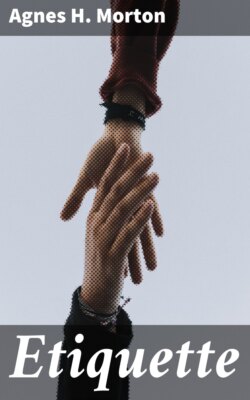Читать книгу Etiquette - Agnes H. Morton - Страница 16
На сайте Литреса книга снята с продажи.
CALLING IN PERSON
ОглавлениеWhen one calls in person the name of the caller is given verbally to the servant who opens the door. The card is not usually sent up, except by a stranger. But sometimes there is difficulty in making the servant understand the name or properly distinguish it from some other similar name. In this case to avoid mistakes the card is sent up.
If the hostess is not at home a card is left by the disappointed caller.
On the occasion of a first call a card is left on the hall table, or other place provided, even though the caller has been received by the hostess. This serves as a reminder that the acquaintance has been duly and formally begun.
On the occasion of subsequent calls, when the hostess is at home, no cards are employed, except, as before stated, to avert servants' mistakes. Such is the sensible dictum of good authorities, and one in harmony with the idea that the personal card is the representative of its owner, not his accompaniment.
This idea is more pointedly illustrated in quiet neighborhoods, where even the wealthy live simply of choice, and, like their neighbors of moderate means, employ but one domestic, or, it may be, none. In such households often the guest is met at the door by a member of the family, possibly the hostess herself. The use of a visiting-card then is plainly incongruous, not to say absurd. The visitor who is paying a "first call" under these informal conditions may find opportunity to drop a card unobtrusively into the basket, if such receptacle be within reach; but if this cannot be done without conspicuous effort the card is better ignored, and its place as a remembrancer filled by the genial impression which the visitor leaves, and of which an appreciative hostess needs no card reminder. Besides, people "living quietly" visit so little, comparatively, that it is no severe tax on the memory to recollect who has called, especially as the infrequency of calls gives ample time for each one to make an individual impression. This is not possible when a steady stream of visitors is pouring in and out of a drawing-room on a fashionable woman's "at home" day, scarcely giving the hostess opportunity to gaze upon one face before another has displaced it; so that at the end of the hour her memory recalls a composite photograph. Cards are her indispensable aids in resolving this picture into its component elements. But those who "live quietly," receiving but few calls, have no such bewildering complexity to deal with.
At the same time, these people thus quietly environed may represent the most refined and cultivated circle. They may know perfectly well what formal etiquette would demand in the matter of cards if the conditions were more formal. The omission of cards whenever their use would be forced, so far from indicating ignorance, is a proof of discrimination.
Personal calls are made in the following cases:
In returning a first visit, made in person.
After a dinner party to which one has been invited, whether the invitation was accepted or not.
After any entertainment other than a dinner it is allowable to leave or send cards instead of paying a personal call. This is a wise rule in cases where a hostess, has a long visiting list, and entertains frequently. To receive afterward personal visits from all of her guests would be practically impossible. The majority will express their acknowledgments by card, leaving it to the most intimate friends of the hostess to pay their respects in person. But among quiet people, where one "Tea" is the extent of a hostess' efforts for the season, the personal call is desirable as showing greater respect and friendliness. Among congenial friends only the plea of a busy life can make the card acknowledgment quite as graceful and acceptable as the personal visit. But if the guest is a comparative stranger, and, for any reason, there is a wish not to extend the acquaintance, the sending of a card meets all the requirements of etiquette, without committing the sender to any further intimacy.
(The alternative for personal calls, is personal card-leaving; the next point to be considered.)
